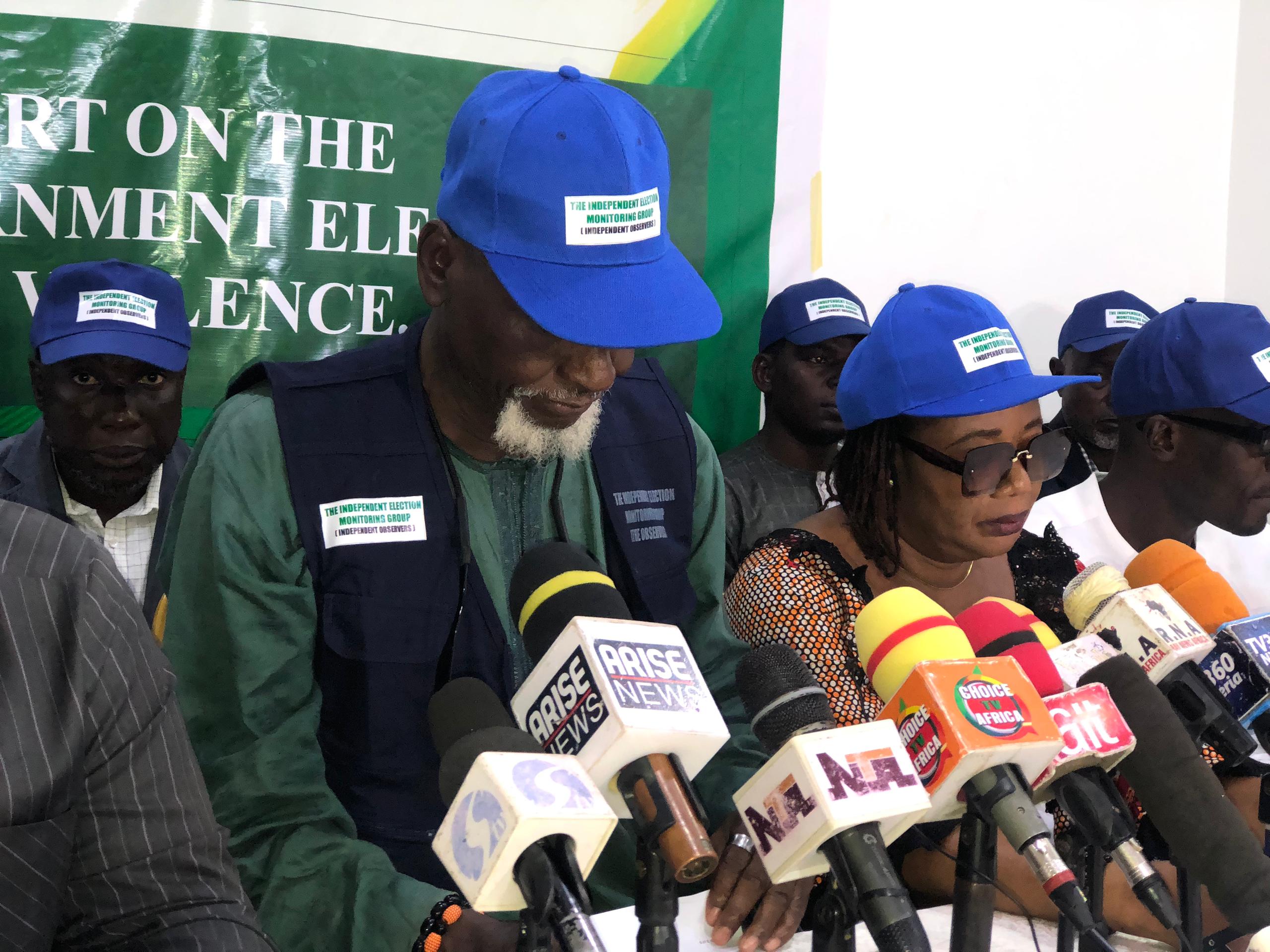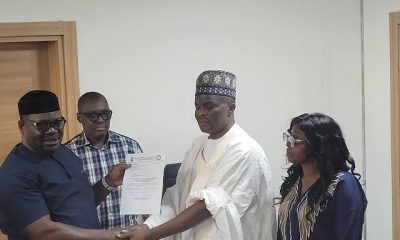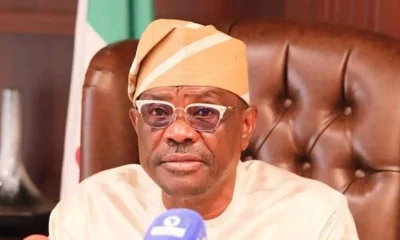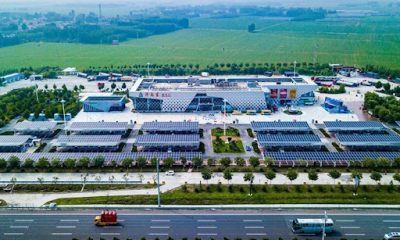Uncategorized
China sees remarkable progress in cyclic utilization of industrial wastewater
By Han Xin, People’s Daily
How much water is used for industrial purposes in China, the world’s largest industrial country?
In 2021, China’s industrial water consumption stood at 104.96 billion cubic meters, which accounted for 17.7 percent of the country’s total water consumption.
China’s water-use efficiency in steel and petrochemical industries has reached the international advanced level though the per capita water resource share in the country is only a quarter of the global average. However, that in some other industries is still seeing room for improvement due to certain reasons such as the backwardness in key technologies and equipment.
With the rapid development of industry, the varieties of industrial products are more diverse and the components of industrial wastewater becoming more complex. Apart from nitrogen, phosphorus and suspended matter, more poisonous and hazardous substances that are difficult to handle have been found in industrial wastewater, such as heavy metal and oil contamination.
Achieving efficient and cyclic utilization of industrial wastewater is key to promoting green development and balancing the supply and demand of water consumption.
After years of efforts, China has made positive progress in the cyclic utilization of industrial wastewater and has seen remarkable results in industrial water conservation.
The discharge of industrial wastewater in the country dropped to 1.34 million tons in 2019 from 2.37 million tons in 2010, a reduction of around 44 percent.
Among industrial enterprises above designated size, or those with annual main business revenue of 20 million yuan (about $2.95 million) or more, the recycling rate of industrial water went up from 89 percent in 2015 to 92.9 percent in 2021, and water consumption per 10,000 yuan of industrial added value in 2020 dropped 39.6 percent compared with 2015.
The recycling rate of industrial water of enterprises above designated size in steel and petrochemical industries stands at 97 percent and 95.2 percent, respectively.
Between 2016 and 2020, key medium- and large-sized iron and steel manufacturers in China reduced wastewater discharge by about 300 million cubic meters and saved 2.1 billion cubic meters of water consumption.
Internal recycling and treatment is the major way of cyclic utilization of industrial wastewater. To tackle the difficulties in the whole process of cyclic utilization, collaborative research in innovations of relevant technologies and equipment are proved to be effective solutions.
An enterprise in Zibo, east China’s Shandong province has launched cooperation with a university to develop technologies that recycle and treat wastewater generated by water jet looms. The enterprise has not only optimized the recycling and treatment of industrial and domestic sewage, but also succeeded in biochemically degrading the sewage, which helps tackle pollution in a targeted manner.
As a result, the recycling rate of industrial water of the enterprise was improved by 6 percent, which saves an annual water cost of 2 million yuan.
Many enterprises are actively exploiting big data, cloud computing and other new-generation information technologies to improve digital management and internet-based collaboration in wastewater recycling and treatment.
In Luzhou, southwest China’s Sichuan province, a chemical enterprise, by installing a monitoring system that covers production links including the reuse of reclaimed water, sewage treatment and circulating water, has basically realized automatic program control.
A big screen in a control room shows whether the industrial wastewater is discharged up to the standard and whether production equipment is running safely. The system can alert users to potential equipment dangers in time, and monitor the cyclic utilization of industrial wastewater in real-time.
In north China’s Tianjin municipality, a steel mill has replaced regular water sources with treated local municipal sewage and reclaimed water from sewage treatment works in nearby towns. The steel mill now achieves zero discharge of wastewater and zero exploitation of groundwater.
Some industrial parks in Beijing have also accelerated their steps of sewage utilization, providing high-quality treated water for production.
“In 2020, the utilization rate of reclaimed water in all Chinese cities stood at around 24 percent. The utilization of urban wastewater treatment is unsatisfactory, which could be further expanded for industrial use,” said Yang Benxiao, senior engineer with the China Electronic Product Reliability and Environmental Testing Research Institute, also known as the Fifth Electronic Research Institute of the Ministry of Industry and Information Technology (MIIT).
Yang believes that increasing the use of urban reclaimed water will remain a key direction for industrial enterprises and parks in cyclic utilization of wastewater.
A plan on cyclic utilization of industrial wastewater jointly released by the MIIT and other departments at the end of 2021 noted that by 2025, the utilization rate of industrial water of enterprises above designated size should reach 94 percent, and their water consumption per 10,000 yuan of industrial added value should decrease 16 percent compared to 2020, which is expected to build a new paradigm of efficient cyclic utilization in major water-consuming industries.
Uncategorized
Form I-130 Approved: A Step-by-Step Guide to the Next Stages
Obtaining approval of Form I-130, Petition for Alien Relative is one of the key milestones in the immigration process. It unveils the process of the next moves in order to bring your loved one to the United States of America. Perhaps they are in the United States or perhaps they are in another country. It is crucial to know what comes next. Alright, let’s define the most crucial questions you may have.
What to do after Form I-130 is approved
It takes several months, after which USCIS will send you a notice that your Form I-130 has been approved. In case your relative resides in another country other than the United States the case will be taken to the National Visa Center (NVC). If they are in the U.S, whether to apply for adjustment of status or to go through consular processing is the next step to be taken.
All the applicants apart from those in the USA will have their case numbers allocated to them by the NVC together with instructions. This encompasses paying fees and completing the form I-130 Petition alien relative and the DS-260 form called the Immigrant Visa and Alien Registration Application. It is important that you be responsive to emails, at least to the official ones to check for updates.
If your relative is in the U.S., you will proceed filing Form I-485, Application to Register Permanent Residence or Adjust Status.
How to apply for Adjustment of Status if you are in the US
Adjustment of Status (AOS) enables Your Relative to get an LPR status without having to travel out of the country. Here’s how to navigate this process:
- Check Eligibility: This should guarantee that the beneficiary is in the United States legally and meets all the requirements of the program.
- File form I-485: Complete and file Form I-485 (Application to Register Permanent Residence or Adjust Status) which is used in changing of immigration status to that of a permanent resident. A general rule of thumb to reduce delay as much as possible is to lay as much accuracy as possible from the onset of the project.
- Gather Required Documents: Most organizations require that you submit some documents Among the documents include:
- Form I-130 approval notice.
- Passport and current visas.
- The form with the name Arrival/Departure Record, also known as I-94.
- Two passport-style photos.
- The results of the medical examination are contained in form I-693.
- Evidence of a relationship with the U.S. citizen or a permanent resident.
- Pay the Fees: The costs associated with a Form I-485 depend on the applicant’s age and other factors of his/her personal situation. Make sure you submit your application with the right fee.
- Attend the Biometrics Appointment: Applicants are required to submit the application and after some time, USCIS will reschedule for fingerprint and photos to be taken. Attendance is crucial.
- Prepare for the Interview: Nevertheless, most applicants will have to go for an interview at a local office of the USCIS. Check your application and gather whatever proof to support your case that you can.
How to apply for consular processing if you are outside the US
For the beneficiaries residing in other countries they then undergo consular processing. Here’s how to handle this process:
- Wait for NVC Notification: Once the I-130 has been approved you will be contacted with a case number and additional directives from NVC.
- Pay Fees and Submit DS-260: When the applicant receives a case number, they should then process the immigrant visa processing fees and fill the Form DS-260.
- Gather Supporting Documents: Gather different documents in order of, barring the letters:
- Your passport, which must be valid for at least six months of the intended stay.
- Birth certificate.
- Police certificates.
- Medical examination results.
- Affidavit of Support or the specific form used for it is I-864.
- Attend the Visa Interview: The last stage is the Visa interview that takes place at a US embassy or a consulate. They should not lie, and they should be ready or willing to answer questions about their relationship and their background.
- Receive Your Visa: When granted you get a stamp on your passport through which you can be able to travel to the United States of America.
It is often not easy to know what to do after Form I-130 has been approved, however it’s important to be informed and organized. No matter whether you are changing your status within the territory of the United States or opting for consular processing, it is important to know what steps to take in order to reach the desired end. The receipt of a green card. Be as organized as you can, keep record of the documents and when necessary, seek legal help. All the best on this great adventure that lies ahead of you!
Uncategorized
Awe Progressive Group Urges Gov. Sule to Consider Hamza Moyi for LGA Chairmanship
From Leo Zwànke, Lafia
Awe Local Government Area Progressive Group has called on the Governor of Nasarawa State, Engineer Abdullahi Sule, to consider Hon. Hamza Ibrahim Moyi for the position of Chairman of the Awe Local Government Council. This appeal comes as the governor and the All Progressives Congress (APC) State Working Committee are set to decide on the candidate for the chairmanship post.
In a press release signed by the group’s spokesperson, Muhammed Musa on Saturday and sent to journalist, the group highlighted Moyi’s contributions to the development of Awe Local Government Area in his capacity as the Senior Special Assistant (SSA) to the governor on Sports. According to Musa, Moyi’s name is among the three submitted for consideration by the governor.
The statement commended Moyi’s dedication to the local government, particularly in areas such as security, education, healthcare, agriculture, and infrastructural development. The group believes that his track record makes him the best fit for the position of council chairman.
“Hon. Hamza Ibrahim Moyi has worked tirelessly as the SSA to the governor, ensuring that Awe Local Government remains secure and that development projects are carried out effectively. His efforts in the areas of education, health, and agriculture have had a direct and positive impact on the people of the local government,” the statement read.
The group further emphasized that Moyi’s leadership has played a pivotal role in fostering peace and stability within the local government, particularly in addressing security challenges that have affected the area in the past.
“We appeal to His Excellency, Governor Abdullahi Sule, to recognize the efforts of Hon. Moyi and give him the opportunity to serve as the Chairman of Awe Local Government Council. His experience, dedication, and commitment to the progress of our local government make him the ideal candidate for this position,” the statement added.
The group expressed confidence that Moyi’s leadership would bring further development to Awe LGA and strengthen its role within the state.
The decision on the chairmanship is expected to be made soon as political activities in Nasarawa State gear up ahead of the local government council elections.
Uncategorized
Rivers LG Polls: Observers Blame Gov Fubara’s Use Of Non-State Actors for Post-Election Violence ***Exonerate Police of Any Wrongdoing Independent observers have condemned the violence and arson that marred the Rivers State local government elections, blaming Governor Siminalayi Fubara’s supporters for the chaos. The Independent Election Monitoring Group, in its preliminary report, cited widespread irregularities, including the lack of election materials, non-use of electoral registers, and dubious declaration of results. Speaking at a press conference, Executive Director, Dr. Emmanuel Agabi, said Governor Fubara’s insistence on conducting the elections despite court rulings and security concerns has been criticized as a desperate bid to consolidate power. Notably, the report cleared the Nigerian Police of any wrongdoing, highlighting their withdrawal from the election due to a Federal High Court ruling. The report recommends a full investigation into the arson attacks, nullification of election results, deployment of federal security forces, and dialogue between the governor and opposition parties. According to the report, the use of violence by Fubara’s supporters in the wake of the election reflects the Governor’s desperation to suppress opposition and maintain control of the political narrative. By allowing his supporters to engage in such acts of violence, it added that Fubara has contributed to the breakdown of law and order in Rivers State. “The Rivers State local government elections and the subsequent acts of arson represent a low point in the state’s political history,” the report said. “Obviously , the state local government elections have exposed the fragility of the democratic process in the state. “Governor Siminalayi Fubara’s determination to consolidate political power through the Action Peoples Party (APP) and disregard for legal rulings has led to a crisis that threatens both the democratic fabric of Rivers State and the security of its citizens. “The refusal to honor court rulings, combined with the manipulation of electoral processes and violent suppression of opposition, demonstrates a clear disregard for the rule of law. “It is evident that Governor Fubara’s supporters, driven by his desperation to build and secure a political stronghold, are responsible for the violence and destruction that followed the elections. “The state’s political crisis will only worsen if urgent steps are not taken to restore order, accountability, and respect for democratic principles. “The use of arson as a tool for political intimidation is not only reprehensible but dangerous, as it has the potential to escalate into broader conflict. If unchecked, this pattern of governance could erode what remains of democratic practice in Rivers State. “It is therefore imperative that Governor Fubara and his administration give peace a chance by embracing dialogue, respecting court rulings, and adhering to democratic norms. “The Governor must realize that power, when pursued at the expense of the people’s trust and the rule of law, is unsustainable. “For the future of Rivers State, and indeed Nigeria’s democratic experiment, it is crucial that stakeholders at all levels work together to address the deep-seated issues that have emerged from this election. “This includes reforming the electoral system, ensuring accountability for violent actions, and fostering a political culture where power is gained through the people’s will, not through coercion, manipulation, or violence. “In the words of former President Goodluck Jonathan, the political crisis in Rivers State is reminiscent of the crisis in the old Western region. It is a warning sign of what could become a larger national issue if the political situation in Rivers State is not addressed. “It is the responsibility of all concerned parties, including the federal government, to intervene and ensure that Rivers State does not spiral into anarchy. Only through collective action can the state be returned to peace, stability, and genuine democratic governance.”

***Exonerate Police of Any Wrongdoing
Independent observers have condemned the violence and arson that marred the Rivers State local government elections, blaming Governor Siminalayi Fubara’s supporters for the chaos.
The Independent Election Monitoring Group, in its preliminary report, cited widespread irregularities, including the lack of election materials, non-use of electoral registers, and dubious declaration of results.
Speaking at a press conference, Executive Director, Dr. Emmanuel Agabi, said Governor Fubara’s insistence on conducting the elections despite court rulings and security concerns has been criticized as a desperate bid to consolidate power.
Notably, the report cleared the Nigerian Police of any wrongdoing, highlighting their withdrawal from the election due to a Federal High Court ruling.
The report recommends a full investigation into the arson attacks, nullification of election results, deployment of federal security forces, and dialogue between the governor and opposition parties.
According to the report, the use of violence by Fubara’s supporters in the wake of the election reflects the Governor’s desperation to suppress opposition and maintain control of the political narrative.
By allowing his supporters to engage in such acts of violence, it added that Fubara has contributed to the breakdown of law and order in Rivers State.
“The Rivers State local government elections and the subsequent acts of arson represent a low point in the state’s political history,” the report said.
“Obviously , the state local government elections have exposed the fragility of the democratic process in the state.
“Governor Siminalayi Fubara’s determination to consolidate political power through the Action Peoples Party (APP) and disregard for legal rulings has led to a crisis that threatens both the democratic fabric of Rivers State and the security of its citizens.
“The refusal to honor court rulings, combined with the manipulation of electoral processes and violent suppression of opposition, demonstrates a clear disregard for the rule of law.
“It is evident that Governor Fubara’s supporters, driven by his desperation to build and secure a political stronghold, are responsible for the violence and destruction that followed the elections.
“The state’s political crisis will only worsen if urgent steps are not taken to restore order, accountability, and respect for democratic principles.
“The use of arson as a tool for political intimidation is not only reprehensible but dangerous, as it has the potential to escalate into broader conflict. If unchecked, this pattern of governance could erode what remains of democratic practice in Rivers State.
“It is therefore imperative that Governor Fubara and his administration give peace a chance by embracing dialogue, respecting court rulings, and adhering to democratic norms.
“The Governor must realize that power, when pursued at the expense of the people’s trust and the rule of law, is unsustainable.
“For the future of Rivers State, and indeed Nigeria’s democratic experiment, it is crucial that stakeholders at all levels work together to address the deep-seated issues that have emerged from this election.
“This includes reforming the electoral system, ensuring accountability for violent actions, and fostering a political culture where power is gained through the people’s will, not through coercion, manipulation, or violence.
“In the words of former President Goodluck Jonathan, the political crisis in Rivers State is reminiscent of the crisis in the old Western region. It is a warning sign of what could become a larger national issue if the political situation in Rivers State is not addressed.
“It is the responsibility of all concerned parties, including the federal government, to intervene and ensure that Rivers State does not spiral into anarchy. Only through collective action can the state be returned to peace, stability, and genuine democratic governance.”
-

 Business13 hours ago
Business13 hours agoOkpella Monarch: Obaseki Ratified Kingmakers Decision, End 5years leadership Vacuum
-

 Banking9 hours ago
Banking9 hours agoFree Food Saga: Akpabio quoted out of context-CSO
-

 Foreign14 hours ago
Foreign14 hours agoSci-tech innovation fuels China’s high-quality development
-

 Entertainment6 hours ago
Entertainment6 hours agoDavido Declares ‘Timeless’ His Best Album
-

 Entertainment6 hours ago
Entertainment6 hours ago‘Adire’ Secures Four Nominations at the Best of Nollywood Awards
-

 Business6 hours ago
Business6 hours agoWike Urges Nigerians to Pay Taxes for Improved Social Services
-

 Foreign8 hours ago
Foreign8 hours agoQinling Mountains better safeguarded with comprehensive digital platform
-

 Foreign8 hours ago
Foreign8 hours agoExpressway service station in Shandong achieves carbon neutrality






